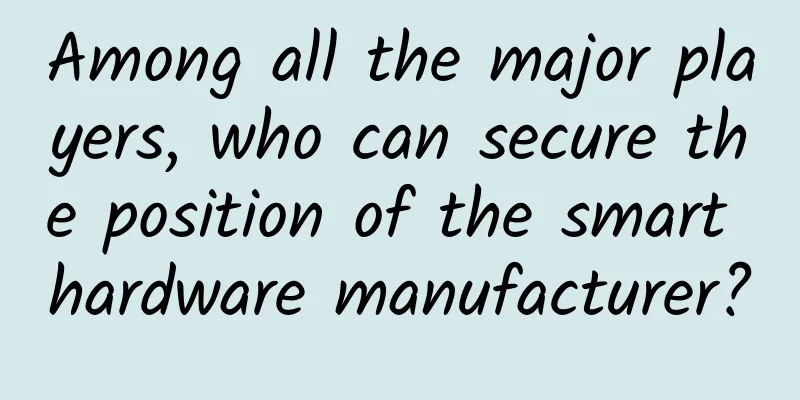Among all the major players, who can secure the position of the smart hardware manufacturer?

|
With the slowdown of domestic economic growth, the domestic capital market has been temporarily cold since the second half of this year. The smart hardware industry, which is dominated by startups, has also been greatly affected. However, like many companies, participants in the smart hardware industry can be divided into two categories: one focuses on the micro-presentation of products, and the other is better at integrating and connecting industrial chain resources. The first type of players are more susceptible to capital dynamics. The second type of participants are more independent, usually with sufficient personnel and financial reserves, excellent technical support, rich industrial chain resources, etc. These companies pay more attention to long-term benefits and overall scale, so their strategic layout can reflect the industry trend more macroscopically than small and medium-sized enterprises that focus on products. We can call them big players in the field of smart hardware. In the "China Smart Hardware Industry Series Research Report" jointly released by iResearch and JD Intelligence, the core players' strategies were specifically studied. What information can we interpret from it? It is observed that according to the main business, the major players in the domestic smart hardware market can be roughly divided into two camps: Internet companies and traditional companies. The former usually start with platform access, using technology, services or funds to attract hardware companies to join or cooperate, aiming to form their own smart hardware network, thereby grasping the entrance to the future Internet of Things; the latter relies on the long-term accumulated industrial chain and hardware advantages to further develop software and network services, and upgrade the entire set of traditional hardware in specific scenarios. Internet companies that use platforms to expand their presence Although they all belong to the first camp, the layouts of major Internet players such as BAT, JD.com, Xiaomi, and 360 also have different focuses. iResearch's report evaluated several major players in the field of domestic smart hardware from several aspects such as incubation and channels. We can see that Xiaomi is the only company among Internet companies that has hardware brand advantages. Indeed, the success of Xiaomi mobile phones has laid a very favorable foundation for its smart hardware layout. Lei Jun once said that he would invest in 100 smart hardware companies to copy the Xiaomi model. This sentence reveals at least two pieces of information. First, Xiaomi will use investment to build its own smart hardware ecosystem. Second, this batch of products will continue the high cost-effective label of Xiaomi mobile phones. This can be confirmed by Xiaomi's smart bracelets, air conditioners, TVs, balance bikes and other products. If we stop at the "low price" step, the essence of intelligence will not be fully reflected. For Xiaomi, the MI UI system can supplement this to a certain extent. Similarly, TOS also occupies a place for Tencent in the intelligent hardware system. Compared with the first two, Alibaba's YunOS system may be more independent. It is developed based on Linux, which makes it less restricted by the underlying layer. In addition, the cloud feature helps the YunOS system to take the lead in grasping the trend of Internet services. Industry insiders have compared cloud services to the soul of smart hardware, and Tencent and JD.com should be counted as two companies that have this advantage. In May 2014, Tencent Cloud announced that its hardware would be open to developers, aiming to simplify backend deployment. In June of the same year, JD.com launched the Smart Cloud Platform to help hardware teams quickly and accurately connect consumers and smart scenarios. Software is no less important to smart hardware than services. Currently, smart hardware products are relatively scattered, and small and medium-sized manufacturers usually operate independently. It is common for one product to be equipped with one application, which is a very bad user experience. At this time, the platform advantages of large players are well reflected. WeChat is a typical example. From the user's perspective, WeChat can basically be used as a necessary social software, so there is no need for additional installation. For smart hardware developers, it is not only more difficult to develop apps independently, but also more expensive to gain public recognition. Therefore, it is not surprising that WeChat, with 600 million users, can attract a large number of hardware manufacturers. However, the average number of smart devices per user is small, and the experience differences brought by different management methods are not obvious. For example, it is like managing the address book of one contact and the address book of a hundred people. The user's operation requirements for the latter are naturally more diverse. In the future, users will also have higher requirements for smart hardware management software, such as a more centralized interface and unified control method. This is similar to the original design intention of JD Weilian. Users can not only control all smart products through one App, but also the control method is simpler. In the entire smart hardware industry, big players play a role similar to setting up a platform. One is a platform for nurturing products, and the other is a platform for presenting products. The former can be seen as an incubation function that helps entrepreneurs connect with capital and various links in the industrial chain, while the latter is a marketing model that connects products and consumers. JD.com is one of the few Internet companies that has set up two such platforms. On the one hand, it provides all-round support for smart hardware startups through the JD+ plan, and on the other hand, it promotes products through two major channels, JD.com crowdfunding and JD.com Mall. The latter provides a rare C-end entry point for new smart hardware products. According to iResearch data, online channels have become the main channel for smart hardware sales, of which JD.com accounts for about 30%. This has something to do with the fit between the user portraits of smart hardware and JD.com consumers. Technology, as the unchanging core of Internet companies, will continue to be extended to the layout of smart hardware. JD's JD+ ecosystem, Baidu's artificial intelligence, and 360's security technology have all been well utilized in the deployment of their smart hardware. Traditional enterprises that focus on specific scenarios Unlike Internet companies, traditional companies are rooted in industries, and their intelligence usually starts from the scenarios they are good at, such as Haier's U+ smart life operating system and Vanke's smart model room. This type of product relies on application scenarios that users are familiar with and has strong landing capabilities, so it can obtain high user stickiness. The report shows that home products are currently the most user-dependent of all smart hardware categories. This shows that traditional enterprises have an original and high-quality entry point for transformation to intelligence. Overall, the smart hardware industry is still in its early stages, with many people watching the excitement but few actually participating. The layout of big players is building confidence in the industry while leading the development of the industry. But in the final analysis, products are the ultimate support for the smart hardware industry. If there is a lack of good products, the platform is just an empty shell. In this sense, whoever can foster a truly heavyweight product will have the opportunity to become the dealer with the last laugh. As a winner of Toutiao's Qingyun Plan and Baijiahao's Bai+ Plan, the 2019 Baidu Digital Author of the Year, the Baijiahao's Most Popular Author in the Technology Field, the 2019 Sogou Technology and Culture Author, and the 2021 Baijiahao Quarterly Influential Creator, he has won many awards, including the 2013 Sohu Best Industry Media Person, the 2015 China New Media Entrepreneurship Competition Beijing Third Place, the 2015 Guangmang Experience Award, the 2015 China New Media Entrepreneurship Competition Finals Third Place, and the 2018 Baidu Dynamic Annual Powerful Celebrity. |
>>: ANZ: Organoid Industry Research Report
Recommend
Cook opened a Weibo account and the comments were bright
Around 3pm this afternoon, Apple CEO Tim Cook ope...
How to understand and analyze user needs? Here are three tips!
When doing product design and operation , of cour...
One lie down, two clap, three roll, fall into the ice hole, remember this can save your life →
On December 10, a middle school student in Fushun...
This seemingly shameful action is actually a "savior" for the lumbar spine! People with back pain should learn this quickly
I once saw a short video in which a blogger serio...
Fainted in the toilet: 60% of Internet practitioners earn less than 6,000 yuan a month
[[134144]] "Working is so tiring, I don'...
How should bidding promotion be optimized to be effective?
How to optimize Baidu SEM company's bidding p...
One article thoroughly grasps the essence of community operation
The topic of community operation is an over-mytho...
The three core techniques for private domain traffic operations!
I read two books before the Chinese New Year, bot...
Apple strengthens privacy protection, iOS 17 can automatically block tracking parameters on websites
With iOS 17 and macOS Sonoma, Apple brings users ...
Huang Zhiyi: A climber who rushes to the highest "rock point" of the "dangerous peak" of algorithms!
Even on days when he is not climbing, Huang Zhiyi...
Online sales increased by 170%, Perfect Diary’s promotion strategy!
In the world of brand marketing, new "market...
Bed bugs are crawling all over the floor, and a bite will spit blood! Bed bug crisis breaks out in many countries, and it's actually very close to you
Recently, news about a "bed bug crisis break...
Li Enlin, "The Innovation and Expansion of Songcheng Performing Arts' "One Play""
Li Enlin's "Songcheng Performing Arts: I...
Cute baby recognized the wrong mother in the mall and refused to let go. When the real mother appeared, the cute baby was confused
Recently, a netizen in Chengdu uploaded a video. ...
YOYO Reading Long and Difficult Sentences Class
YOYO Reading Long and Difficult Sentences Class R...









